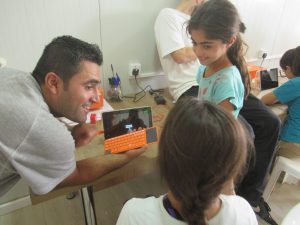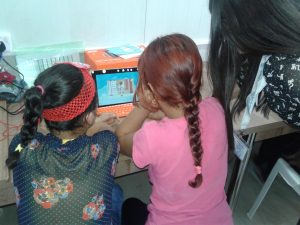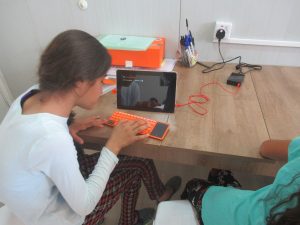-
What We Do
- WHERE WE WORK
-
About Us
 Welcome Message from Carol Jenkins
Welcome Message from Carol JenkinsFor more than 90 years, World Learning has equipped individuals and institutions to address the world’s most pressing problems. We believe that, working together with our partners, we can change this world for the better.
On my travels, I’ve had the opportunity to meet with many of those who have joined us in this mission. In Baghdad, we’ve trained more than 2,300 Iraqi youth who are already giving back at home. In London, our partners in the TAAP Initiative strongly believe that we are all responsible to practice inclusion. And in Vermont, our Experiment in International Living and School for International Training participants prove every day that they have the tools and the determination to change the world.
Please join us in our pursuit of a more peaceful and just world.
- Get Involved
Media Center > Story
Kids Can Code: Teaching Technology in Iraq
December 14, 2018
 Five days a week, around 200 school-aged children huddle around U-shaped tables in the activity center at the Arbat refugee camp in northern Iraq. Together, the children build computers and learn basic coding, all while they practice English and develop strategies for coping in a difficult environment.
Five days a week, around 200 school-aged children huddle around U-shaped tables in the activity center at the Arbat refugee camp in northern Iraq. Together, the children build computers and learn basic coding, all while they practice English and develop strategies for coping in a difficult environment.
These lessons are at the heart of Kids Can Code, a club for refugee children born out of an innovative new partnership that World Learning has launched alongside technology company Kano and Kurdistan Save the Children (KSC), with funding from the Catalyst Foundation for Universal Education.
“This is a really terrific partnership. We were thrilled to find an organization equipped to put together a program that would use this innovative product, which teaches a valuable skill and gets kids engaged with STEM,” says Emily Daughtry, senior program officer at Catalyst.
 Kids Can Code builds upon Kano’s intuitive technology and computer coding lessons, which give young people the skills they need to find jobs in the modern workforce and to shape the digital world. World Learning, a leader in global education, adapted that curriculum to make it accessible for students in the camp, most of whom speak little to no English and often struggle with trauma.
Kids Can Code builds upon Kano’s intuitive technology and computer coding lessons, which give young people the skills they need to find jobs in the modern workforce and to shape the digital world. World Learning, a leader in global education, adapted that curriculum to make it accessible for students in the camp, most of whom speak little to no English and often struggle with trauma.
Dr. Kara McBride, senior education program specialist at World Learning, led the effort to form that curriculum. She likens her approach to the way Kano teaches kids to “hack” coding by offering easy-to-use lessons and games.
“I ended up taking that concept and hacking English,” she says.
McBride built vocabulary and grammar lessons and games designed to help students progress through the Kano coding lessons, which begin with simple and direct commands but grow more challenging each week. For example, McBride introduced a game called “Move If…,” in which students switch places with one another in response to commands their teacher gives in a combination of English and Kurdish. The game prepares students to use commands to move the cursor around in one of the Kano applications and later to understand “if…then” statements.
 Though English and technology skills are the main aims of the club, McBride says the curriculum design also builds soft skills — like collaboration and problem solving — and is embedded with psychosocial support elements to help children who are dealing with difficult life circumstances feel safe in the classroom and develop skills for making friends and handling emotions. Kids Can Code teachers are trained to provide the emotional support their students need. “From the very first minute they walk in, you’re greeting them and being interested in their lives,” McBride says.
Though English and technology skills are the main aims of the club, McBride says the curriculum design also builds soft skills — like collaboration and problem solving — and is embedded with psychosocial support elements to help children who are dealing with difficult life circumstances feel safe in the classroom and develop skills for making friends and handling emotions. Kids Can Code teachers are trained to provide the emotional support their students need. “From the very first minute they walk in, you’re greeting them and being interested in their lives,” McBride says.
Kids Can Code’s daily operations will be sustained by KSC, an Iraqi humanitarian organization. World Learning connected with KSC through the extensive alumni network of another World Learning program, the U.S. Department of State-funded Iraqi Young Leaders Exchange Program (IYLEP). McBride says that partnership was essential.
“It is huge,” she says. “There’s no way we could access the camp without them.”
Catalyst, the funding partner, was also critical to the success of Kids Can Code. Catalyst supports projects that encourage kids to strive for higher education as well as non-formal education projects that help keep them engaged in education no matter their circumstances. Daughtry says the Kids Can Code project perfectly bridges those two pillars.
“It’s an exciting way to engage young people in a 21st century skill that’s really valuable,” she says. “And hopefully it will also spark their interest and keep them engaged with STEM skills in a way that will make it easier for them to stay on a pathway to higher education.”





